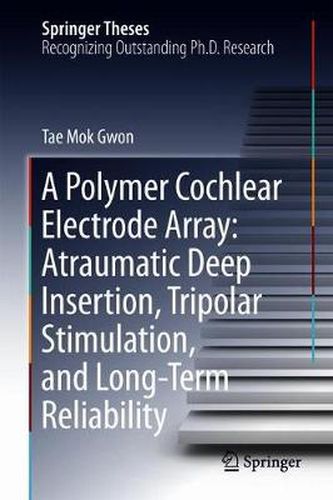Readings Newsletter
Become a Readings Member to make your shopping experience even easier.
Sign in or sign up for free!
You’re not far away from qualifying for FREE standard shipping within Australia
You’ve qualified for FREE standard shipping within Australia
The cart is loading…






This title is printed to order. This book may have been self-published. If so, we cannot guarantee the quality of the content. In the main most books will have gone through the editing process however some may not. We therefore suggest that you be aware of this before ordering this book. If in doubt check either the author or publisher’s details as we are unable to accept any returns unless they are faulty. Please contact us if you have any questions.
This book describes the design, fabrication and evaluation of a polymer-based neural interface for a cochlear electrode array, reviewed in terms of fabrication process, functionality, and reliability. Polymer-based devices have attracted attention in the neural prosthetic field due to their flexibility and compatibility with micro-fabrication process. A liquid crystal polymer (LCP) is an inert, highly water-resistant polymer suitable for the encapsulation of electronic components and as a substrate material for fabricating neural interfaces. The author has designed, fabricated, and evaluated an LCP-based cochlear electrode array for an improved polymer-based cochlear implant. The thesis deals with 3 key topics: atraumatic deep insertion, tripolar stimulation, and long-term reliability. Atraumatic insertion of the intracochlear electrode and resulting preservation of residual hearing have become essential in state-of-the-art cochlear implantation. A novel tapered design of an LCP-based cochlear electrode array is presented to meet such goals. For high-density and pitch-recognizable cochlear implant, channel interaction should be avoided. Local tripolar stimulation using multi-layered electrode sites are shown to achieve highly focused electrical stimulation. This thesis addresses another vital issue in the polymer-based neural implants: the long-term reliability issue. After suggesting a new method of forming mechanical interlocking to improve polymer-metal adhesion, the author performs accelerating aging tests to verify the method’s efficacy. The aforementioned three topics have been thoroughly examined through various in vitro and in vivo studies. Verification foresees the development of LCP-based cochlear electrode array for an atraumatic deep insertion, advanced stimulation, and long-term clinical implant.
$9.00 standard shipping within Australia
FREE standard shipping within Australia for orders over $100.00
Express & International shipping calculated at checkout
This title is printed to order. This book may have been self-published. If so, we cannot guarantee the quality of the content. In the main most books will have gone through the editing process however some may not. We therefore suggest that you be aware of this before ordering this book. If in doubt check either the author or publisher’s details as we are unable to accept any returns unless they are faulty. Please contact us if you have any questions.
This book describes the design, fabrication and evaluation of a polymer-based neural interface for a cochlear electrode array, reviewed in terms of fabrication process, functionality, and reliability. Polymer-based devices have attracted attention in the neural prosthetic field due to their flexibility and compatibility with micro-fabrication process. A liquid crystal polymer (LCP) is an inert, highly water-resistant polymer suitable for the encapsulation of electronic components and as a substrate material for fabricating neural interfaces. The author has designed, fabricated, and evaluated an LCP-based cochlear electrode array for an improved polymer-based cochlear implant. The thesis deals with 3 key topics: atraumatic deep insertion, tripolar stimulation, and long-term reliability. Atraumatic insertion of the intracochlear electrode and resulting preservation of residual hearing have become essential in state-of-the-art cochlear implantation. A novel tapered design of an LCP-based cochlear electrode array is presented to meet such goals. For high-density and pitch-recognizable cochlear implant, channel interaction should be avoided. Local tripolar stimulation using multi-layered electrode sites are shown to achieve highly focused electrical stimulation. This thesis addresses another vital issue in the polymer-based neural implants: the long-term reliability issue. After suggesting a new method of forming mechanical interlocking to improve polymer-metal adhesion, the author performs accelerating aging tests to verify the method’s efficacy. The aforementioned three topics have been thoroughly examined through various in vitro and in vivo studies. Verification foresees the development of LCP-based cochlear electrode array for an atraumatic deep insertion, advanced stimulation, and long-term clinical implant.